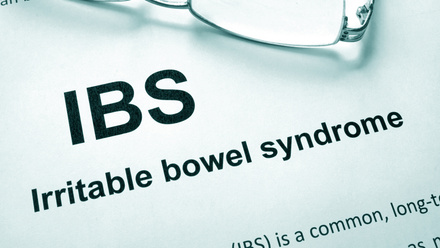April is IBS Awareness Month and a good time to reflect on the difficulties many irritable bowel syndrome (IBS) sufferers experience on their journey to symptom resolution and how we can better help them as dietitians.
Irritable bowel syndrome is a chronic gastrointestinal disorder characterised by fluctuating abdominal pain or discomfort associated with an altered bowel habit in the absence of organic disease(1 - see references below ) . With 10-20% of people in the UK estimated to have IBS,(1 - see references below ) it would be easy to assume that the journey to symptom resolution is a well-trodden and well-signposted one. Unfortunately for many, this is not the case. Here are four common patient pitfalls that dietitians can address.
1. Suffering in silence
It is estimated that only up to 50% of people with IBS symptoms present to primary care clinicians.2 Some are not aware that their symptoms are treatable and so they soldier on. Many are simply too embarrassed to come forward and disclose their symptoms to a healthcare professional. It may take several years after an onset of symptoms to receive a diagnosis of IBS as some patients navigate numerous appointments, diagnostic tests and referrals to rule out other conditions.3 In the interim, their quality of life is greatly reduced (in line with other chronic conditions such as type 2 diabetes).4 A reduction in IBS clinics in 2020/21 due to the COVID-19 pandemic will only have exacerbated the situation further.
What can dietitians do? This month we can help raise awareness for UK charities that support people with IBS, such as The IBS Network and Guts UK. Throughout April, The IBS Network are running a campaign called ‘Back to Basics’ to share key information about IBS diagnosis and management. Consider putting up information posters in dietetic out-patient clinic waiting areas, adding a link to the BDA ‘Irritable Bowel Syndrome and Diet’ Food Fact Sheet to your dietetic website or talking about IBS on social media to help normalise the conversation around bowel symptoms.
2. Following the wrong journey for diagnosis or treatment
NICE and the BDA Gastroenterology Specialist Group have mapped out the recommended management pathway for individuals with IBS.1,5 Unfortunately, many sufferers are not aware of these pathways or become frustrated by their NHS experience. They are often self-directed by ‘Dr Google’ where they click on paid advertisements promising quick solutions through alternative/private practitioners and expensive ‘intolerance’ tests such as IgG, Vega, hair analysis or kinesiology tests. As dietitians, we often see these patients after years of following highly restrictive diets and have to be the bearers of bad news that they didn’t have to exclude all these foods in the first place and that the tests they paid for are not considered reliable.
What can dietitians do? We need to be sympathetic that this patient group have daily symptoms they are desperate to alleviate and NHS timings are often not conducive for a speedy resolution. We can support them to get back on the right journey and explain where they are on the journey help manage their expectations. Importantly, we can address any disordered eating and suggest changes needed for a more nutritionally balanced diet. The BDA ‘Food Allergy and Food Intolerance Testing’ Food Fact Sheet is a useful resource to share with any individuals that would like more information about which tests have a scientific basis.
3. Never receiving dietetic support
Diet is a key treatment strategy for many individuals with IBS. Nine out of 10 individuals report that food generates symptoms and two-thirds of IBS sufferers initiate dietary restrictions to improve their symptoms.5 Unfortunately, many never get the support of a dietitian. This may be due to GPs not referring on, long waiting times to see an NHS dietitian, or a lack of personal funds or private health insurance to see a dietitian privately. The consequence of this is that many IBS sufferers never get proper first line dietary advice (shown to help alleviate IBS symptoms in up to 50% of sufferers5) before embarking on a low FODMAP elimination diet. Some GPs may even recommend the low FODMAP diet, which is not advised by NICE, and this may not be appropriate for some patients. GPs may not provide the right information or follow up. Without proper dietetic guidance, patients often turn to the internet or Facebook groups for advice.
What can dietitians do? It may be helpful to make other healthcare professionals aware of the BDA ‘Irritable Bowel Syndrome and Diet’ Food Fact Sheet and that they can share this with patients. Try to attend training days for GPs in your local PCT to highlight the NICE/BDA recommended pathways for IBS, explain the importance of first line advice and signpost them to useful resources. If dietetic resources are limited in your local area, then signpost GPs to the Patient Webinars website for online IBS resources developed by dietitians. It may also help to present a business case to your trust for IBS group education which can reduce outpatient waiting times.
4. Not following the low FODMAP diet properly
The low FODMAP diet can be effective for IBS symptoms if done properly6 but is seen by many individuals to be a complicated diet and may take weeks to come to grips with new ingredients and new recipes. The complexity of the diet is not helped by the contradicting information found on the internet and shared in Facebook communities. Compliance may also be an issue due to some individuals lacking the time or cooking skills to properly restrict FODMAPs. Worryingly, many continue on the diet for years and never reintroduce FODMAPs with possible implications on their nutritional status and gut microbiome.6 When asked what they would do differently if they were diagnosed with IBS again, 19% of respondents said they would seek dietetic support for the low FODMAP diet.7
What can dietitians do? If you have not had low FODMAP diet training, sign up for the BDA or King’s College London courses run regularly throughout the year and which are now available online. When seeing patients on the low FODMAP diet always reinforce the need to reintroduce FODMAPs and highlight the risks of not doing so. As mentioned above, group education programmes may help individuals access dietetic support before starting the diet. Low FODMAP ready meals developed by Field Doctor (certified low FODMAP by Monash University and suitable for the elimination stage of the diet) can offer patients a convenient meal solution if they don’t want to cook from scratch. There are also low FODMAP soups and gravies (Bay’s Kitchen) and snacks (Fody Foods) available in the UK.
Your April 2021 challenge
Dietitians play a key role in the proper dietary management of IBS but we also need to raise awareness of our role and how people can access our services. Challenge yourself this month to make a difference – get vocal about IBS, get some training in IBS management, motivate for group education or help signpost IBS sufferers to reputable resources. Every little initiative can help!
Advice from IBS sufferers to the newly diagnosed
“Many doctors seem to be recommending the FODMAP diet without understanding it properly.”
“Be kind to yourself as it is incredibly hard to adjust to IBS.”
“Read as much as you can about it but remember everyone has different triggers and your needs are unique.”
“Don’t lose hours to Google! Find a good dietitian/nutritionist who has a specialism in gut health.”
“To have patience, accept the frustration and allow yourself to take some time. There is no quick fix and it is very much of a journey of trial and error.”
“You are not alone! Be kind to yourself and don’t be afraid to ask for help.”
“Do something about it. I left my symptoms for years and years and suffered in silence.”
“It’s easy to half-ass the FODMAP diet and not take it seriously – but then be angry when it doesn’t work.”
“Don’t take no for an answer from your GP. The help of a dietitian can really improve your low FODMAP diet outcome.”
“Ask to be referred directly to a registered IBS dietitian as soon as you have a diagnosis to save yourself from years of misinformation and associated bowel issues!”
References
- National Institute for Clinical Excellence (NICE) (2016) [CG61] Irritable bowel syndrome in adults: diagnosis and management nice.org.uk/guidance/cg61 (accessed 15 March 2021)
- NICE (2015) [QS114] Irritable bowel syndrome Quality Standards Briefing nice.org.uk/guidance/qs114/documents/irritable-bowel-syndrome-in-adults-qs-briefing-paper2 (accessed 15 March 2021)
- Drossman, D.A, Blank Morris, C., Schneck, S., Hu Y.J.B, Norton, N.J, Norton, W.F., Weinland, S., Dalton, C., Leserman, J., and Bangdiwala,S.I. (2009) International Survey of Patients with IBS. Journal of Clinical Gastroenterology July; 43(6): 541–550
- H. B. El-Serag, H.B., Olden, K., Bjorkman, D. (2002). Health‐related quality of life among persons with irritable bowel syndrome: a systematic review. Alimentary Pharmacology & Therapy; 16: 1171–1185.
- McKenzie, Y. A., Bowyer, R. K., Leach, H., Gulia, P., Horobin, J., O’Sullivan, N. A., ... & Thompson, J. (2016). British Dietetic Association systematic review and evidence-based practice guidelines for the dietary management of irritable bowel syndrome in adults (2016 update). Journal of Human Nutrition and Dietetics, 29(5), 549-575.
- Staudacher HM, Whelan K The low FODMAP diet: recent advances in understanding its mechanisms and efficacy in IBS. Gut 2017;66:1517-1527.
- Field Doctor Survey 2021 (unpublished).



